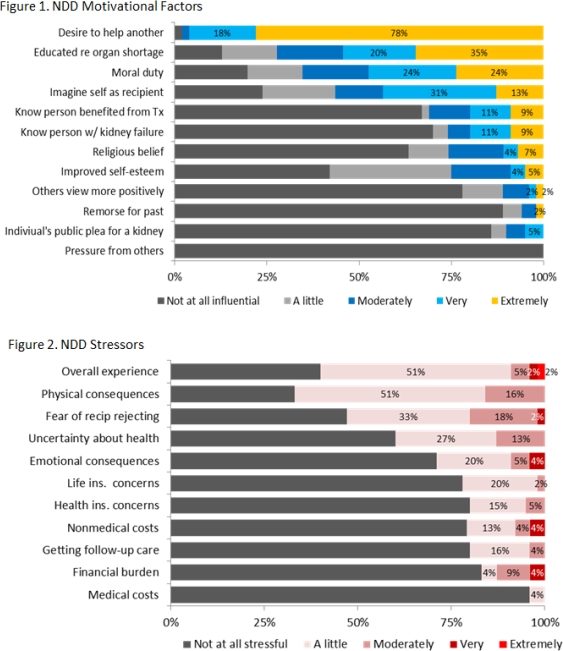Motivation and Stress Associated with Non-Directed Kidney Donation.
J. Wiseman,1 D. Berglund,1 C. Jacobs,1 D. Larson,1 C. Garvey,1 M. Vogues, S. Rein,1 O. Sanchez,1 C. Radecki Breitkopf,2 H. Ibrahim,1 A. Matas.1
1U of MN, Mpls
2Mayo Clinic, Rochester.
Meeting: 2016 American Transplant Congress
Abstract number: 533
Keywords: Donors, Psychosocial, unrelated
Session Information
Session Name: Concurrent Session: Living Kidney Donor Evaluation
Session Type: Concurrent Session
Date: Tuesday, June 14, 2016
Session Time: 4:30pm-6:00pm
 Presentation Time: 4:54pm-5:06pm
Presentation Time: 4:54pm-5:06pm
Location: Ballroom B
Background: Nondirected kidney donors (NDDs) are unique in that they have the risks of nephrectomy but often do not have the benefit of seeing the positive impact of their donation. Little is known about what motivates NDD to donate, or how they view donor-related stressors.
Methods: We surveyed NDDs regarding factors motivating them to donate and about possible donor-related stressors. Scales were adapted from 2 separate previous donor studies (Rodrigue; Johnson). NDDs were asked to rate both motivation and stress on a 5 point Likert scale. We also asked about regret related to their decision to donate.
Results: 55 out of 91 (60%) responded (mean time from donation [±SD], 6.5±4 yrs.) Mean age at donation was 44±11 years, 56% =female, and 98% =White. At the time of donation 86% had > HS education and 91% were employed. Non-responders had donated longer ago and more likely to smoke. Regarding motivational factors, very or moderately influential were (Fig 1): desire to help another (96%), awareness of organ shortage (55%), moral duty (48%), and imagining self as recipient (44%). Rare were being viewed positively by others (4%), remorse (2%), and pressure from others (0%).
Regarding stress: 51% reported the overall donation experience as 'a little' stressful, 5% moderate and 4% very or extremely stressful (Fig 2). The most common stressors were concern related to possible physical consequences (67%); fear of recipient rejecting (53%); uncertainty about health (40%), and emotional consequences (29%). When asked to reflect on the decision to donate, 95% did not think their decision “did a lot of harm”; 100% agreed donating was the right decision, and a wise one. Not one regretted their choice to donate.
Conclusion: The majority of the NDDs are driven by their desire to help, and universally agree that their decision to donate was the right one. Some had stress related to donation, but they still did not regret their decision. Understanding stressors for NDDs may help transplant centers target additional supports.

CITATION INFORMATION: Wiseman J, Berglund D, Jacobs C, Larson D, Garvey C, Vogues M, Rein S, Sanchez O, Radecki Breitkopf C, Ibrahim H, Matas A. Motivation and Stress Associated with Non-Directed Kidney Donation. Am J Transplant. 2016;16 (suppl 3).
To cite this abstract in AMA style:
Wiseman J, Berglund D, Jacobs C, Larson D, Garvey C, Vogues M, Rein S, Sanchez O, Breitkopf CRadecki, Ibrahim H, Matas A. Motivation and Stress Associated with Non-Directed Kidney Donation. [abstract]. Am J Transplant. 2016; 16 (suppl 3). https://atcmeetingabstracts.com/abstract/motivation-and-stress-associated-with-non-directed-kidney-donation/. Accessed March 4, 2026.« Back to 2016 American Transplant Congress
